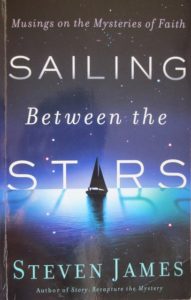I usually have at least two books going at any given time—a fiction book for enjoyment and a teaching book to help me grow in my Christian life. Sailing Between the Stars by Steven James didn’t look as though it fit into either category. I often pulled it off my bookshelf, read the back cover, and slipped it back into what was becoming its permanent home. I was never in the mood for “stunning essays and evocative stories” that explored “the wonder, paradox, and presence of Jesus in life today.” Essays sounded like boring papers I had to write in English class, and paradox sounded like way more thinking than I wanted to do. For years the book sat on my shelf unread.

Recently, I was in need of a good story. Not finding one, I pulled out Sailing Between the Stars, read the back cover . . . and because I was desperate, opened it. By the end of page one, I considered relocating it to the trash can. The author described some peculiar behavior of one of his daughters (whom he wisely didn’t name). Among them, when she was three she ran through the house naked every time company came, and at the age of five she sat next to her aunt and began licking her arm. Her innocent explanation for the latter was that she was “kissing her the grown-up way.” If this was the kind of children he raised, I was pretty sure I didn’t want to spend my time reading anything Mr. James wrote about God.
In fairness, though, I had to read on and give him a chance. It’s the whole “judge not” thing, you know. And I was so glad I did. In the next few pages, James used the oddities of his daughter to discuss a mystery in Christianity. As humans, we each have our peculiar behaviors, but we also have a thread of beauty running through our lives, revealing we are meant for a place greater than the world we now inhabit. He illustrates the situation we are all in with words from a friend of his: “We are each Cinderella in a moment of transformation—half dressed in ashes and rags, half clothed in a royal gown ready to meet the prince.” How perfectly that describes us. I’m not so different from the author’s daughter, after all. (And there was a purpose in telling me his daughter licked her aunt’s arm. What a relief!)

Every subsequent ridiculous story, like spilling Joy detergent on his pants right before he had to preach or kicking over the diaper pail and splashing polluted water into the faces of his young daughters, was a stepping stone to a destination. Sometimes I followed James through dense woods on the Where-in-the-world-are-we-going Path while enjoying the scenery of his humorous and quirky writing. But eventually we would come to a clearing where before me stood an Aha! Shelter. Point made. And his points always sounded like solid theology to me.
James’s unique perspective on well-known Biblical stories was eye-opening. Rather than looking for the main point in a story, he likes to look for the struggle. He says it has opened up a new way for him to understand what God is telling us. My favorite in his book was the account in Luke 2:41-52 of when Jesus, as a boy, was left behind in Jerusalem. His family had gone there for the Passover feast. When they left to return home to Nazareth, a day passed before anyone noticed Jesus was missing. Mary and Joseph went back to look for him. After three days, they found him in the temple talking with the teachers. Mary greeted Jesus with, “Your father and I have been anxiously searching for you.”

The story seems to be about Jesus being lost and then found by his parents. But when James looked for the struggle, which every story’s main character has, he didn’t see any in Jesus. He did see Mary’s inner struggle, though, when she said “your father and I.” She knew Jesus’s father was God, but Jesus was so human that she had begun to think of Joseph as His father. If Mary had remembered that Jesus was God, she wouldn’t have referred to Joseph as His father. James concludes that Mary, not Jesus, is the one who was lost and Jesus stayed behind to remind her—and us—who He is.
I love being shown new ways to look at familiar stories. I briefly questioned how James could say the story wasn’t about Jesus. Everything is about Jesus. After all, it’s when we make the story about us that life doesn’t work as it was meant to. But I quickly understood that he was simply speaking from a literary perspective. Jesus is always the center of our story whether we see Him or not. He is never lost. He is always doing whatever He needs to in order to reveal Himself to us in our lostness.
I rarely read a book twice, but I had to read Sailing Between the Stars again so it would be fresh in my mind to write this. It was so worth it. After the first reading, my main remembrance of the author was that he was wacky. Now I think more of him as human, normal, and relatable. He shares his wonderings about suffering in the world, the effectiveness of prayer, nibbling doubts that swirl around with his faith, and other such things that nag at most of us from time to time.

I shouldn’t have judged Sailing Between the Stars by its back cover. James’s essays are not boring. They are thought-provoking and mind-expanding. And being a poet, James has included his poems in nearly every chapter. Even his prose sounds lyrical. As an example, “What dawn is to the night and spring is to the winter, so Jesus is to my soul.”
Paradoxes do indeed run throughout the book, and my head was sometimes spinning, but the discussions gave me a lot to ponder. James is fascinated by the mysteries with which Christianity and life overflow: the people with the fullest lives are the ones who are always giving themselves away; the world is not a glass half full or half empty, but it is completely full of good and full of evil; the Father is God, Jesus is God, and the Holy Spirit is God, yet there is only one God, not three. As James says, God is mysterious and indefinable. I love his perspective on it. “It keeps God where he should be: within reach of my heart, but not of my mind.” And what kind of God would He be if we could explain Him?
Sailing Between the Stars turned out to satisfy both of my category needs. It was great reading for spiritual growth, and I found it to be as enjoyable as a novel.




Brenda
August 13, 2020What interesting ways to look at things, thanks for sharing! It’s fun to have our minds stretched, to see a different perspective, and to realize we get in mind-ruts and need to occasionally be stretched out of them. And discovering a new book-treasure is always fun!
bspencer
August 13, 2020Yes, I agree–we do need stretching! And it’s really exciting when you find the book greatly reduced at a bookstore that is going out of business and years later you discover what a gem you purchased.